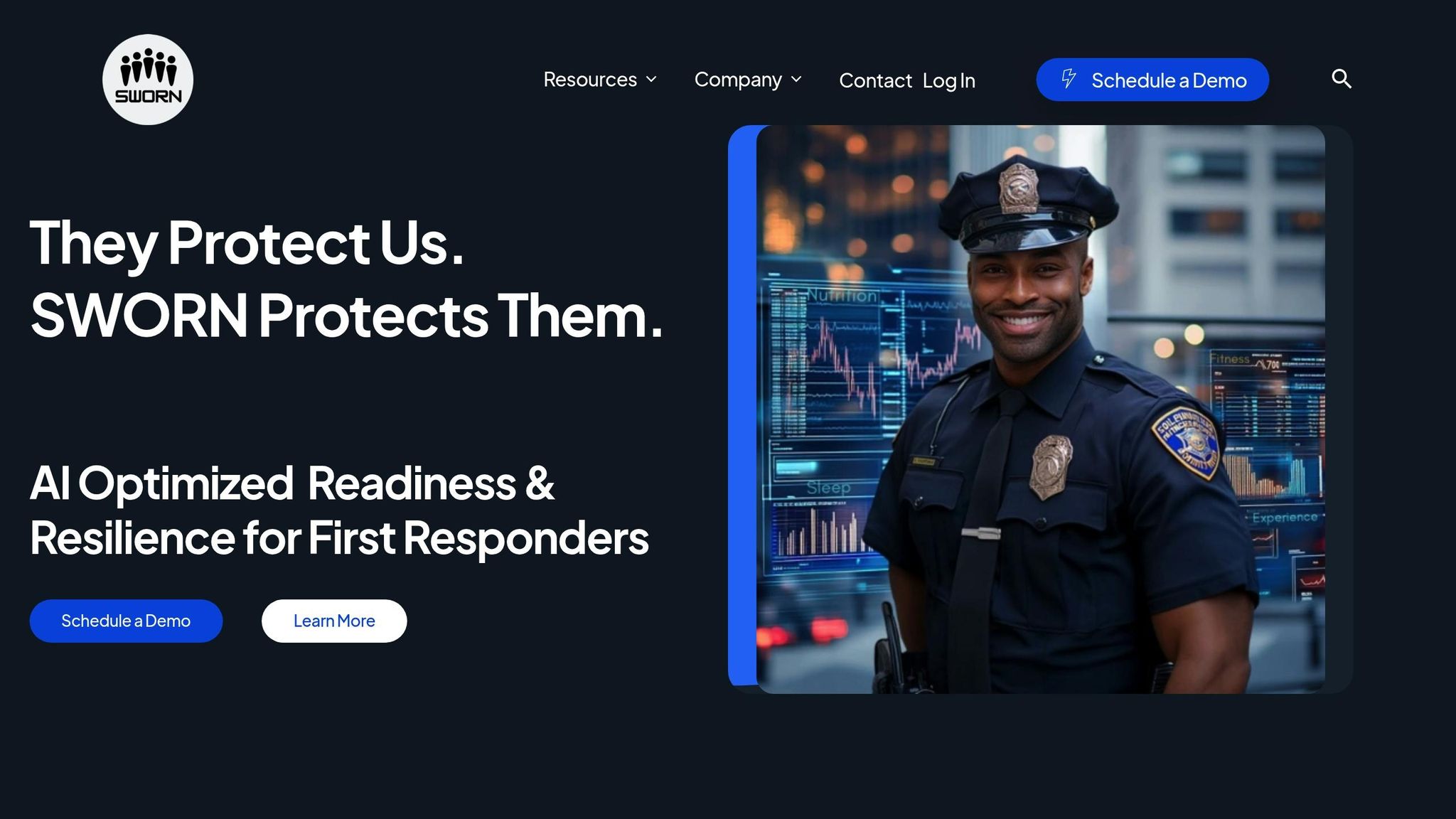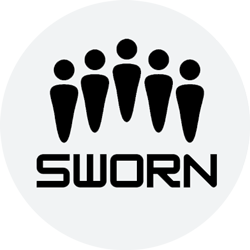First responders face extreme physical and mental challenges, leading to alarming statistics: U.S. police officers have an average life expectancy of just 57 years, and 85% report mental health symptoms like depression or PTSD. AI-powered tools like SWORN.ai are stepping in to help by monitoring stress, analyzing workloads, and offering tailored recovery plans. Here’s how:
- Real-Time Monitoring: Tracks biometric data (heart rate, sleep, stress markers) for early fatigue detection.
- Personalized Recovery: Provides custom exercise, rest, and mental health strategies.
- Work Pattern Analysis: Optimizes shifts and recovery time to reduce burnout risks.
- Privacy Protection: Ensures data security with encryption and HIPAA compliance.
Workload Recovery Basics
What Is Workload Recovery?
Workload recovery refers to the structured process of restoring both physical and mental energy after demanding tasks. It focuses on addressing immediate physical exhaustion as well as the long-term buildup of stress. This approach is especially crucial for first responders, who often face unique physical and mental challenges on the job.
Stress Factors First Responders Face
First responders deal with a mix of physical and mental stressors that make recovery more complex:
-
Physical Stressors:
- Long shifts (12–24 hours)
- Disrupted sleep schedules
- Intense physical activity
- Exposure to hazardous environments
-
Mental Stressors:
- Witnessing traumatic events
- High-pressure decision-making
- Maintaining constant alertness
- The emotional toll of assisting people in crisis
These stressors take a toll. In fact, 85% of first responders report experiencing mental health symptoms. This highlights the importance of a well-thought-out recovery plan.
Consequences of Poor Recovery
The statistics are alarming: the average life expectancy for U.S. police officers is just 57 years. Skipping proper recovery can immediately impair reaction times, decision-making abilities, physical performance, and stress management.
Over the long term, neglecting recovery can lead to serious issues like depression, PTSD, heart attacks, and even fatal outcomes.
"They Protect Us. SWORN Protects Them." – SWORN.ai
These long-term consequences not only endanger personal health but also compromise workplace safety and effectiveness.
Why Stress Makes First Responders Suck (and what can be …
AI Tools for Recovery Management
AI tools use real-time biometric data and workload insights to help prevent burnout and improve recovery efforts.
Biometric Data Tracking
AI systems analyze biometric data from wearables to monitor vital signs and stress levels. This real-time tracking helps spot early signs of fatigue or strain before they escalate.
Key metrics tracked include:
- Heart rate variability
- Sleep quality and patterns
- Physical activity levels
- Stress markers
- Recovery status
Platforms like SWORN.ai combine these biometric insights with AI to deliver real-time health updates. This is particularly important for police officers, who face a five times higher risk of heart attacks compared to the general population.
In addition to biometric monitoring, AI also evaluates work schedules to pinpoint risks and improve recovery.
Workload Pattern Analysis
AI algorithms analyze work patterns to identify risks and refine scheduling. Key factors include:
- Shift lengths and timing
- Recovery time between shifts
- Physical exertion levels
- Stress exposure patterns
This data-driven approach helps reduce the effects of cumulative stress.
Personal Recovery Plans
Using the collected data, AI develops tailored recovery strategies. SWORN.ai offers personalized recommendations across multiple areas:
| Recovery Area | AI Recommendations |
|---|---|
| Physical Wellness | Custom exercise plans, recommended rest periods |
| Mental Health | Self-care tools, stress management techniques |
| Work-Life Balance | Optimized schedules, dedicated recovery time |
| Crisis Prevention | Early warning triggers, support system activation |
"SWORN.AI is the first public safety health, wellness and performance platform integrating AI, real-time biometrics, real-world experience data, and steadfast peer, family & professional support."
This personalized approach ensures both short-term relief and long-term recovery through targeted solutions.
sbb-itb-aa48905
Using AI Recovery Systems
AI-powered recovery systems provide first responders with tools tailored to support their recovery efforts. SWORN.ai’s platform offers targeted features and strategies based on evidence, complementing the recovery approaches discussed earlier.
SWORN.ai Recovery Features

SWORN.ai integrates multiple data sources to give a clear picture of first responder wellness. Its main features focus on three key areas:
| Feature Area | Functionality | Purpose |
|---|---|---|
| Real-time Monitoring | Wearable devices track biometrics | Alerts for stress levels and recovery updates |
| Experience Analysis | Tracks events via CAD/RMS and confidential surveys | Evaluates workload effects on well-being |
| Support Network | Access to peer, family, and professional resources | Helps with goal-setting and building resilience |
AI System Advantages and Considerations
These features highlight the potential of AI systems while acknowledging their boundaries:
-
Early Risk Detection
AI helps spot health risks like depression and PTSD early, which is especially critical given their higher prevalence among first responders. -
Tailored Support
The system provides tools and recommendations such as:- Self-care resources based on evidence
- Training suggestions tailored to workload
- Wellness strategies aligned with personal goals
-
Privacy-Centered Design
Data is collected and analyzed privately, ensuring first responders can seek support without concerns about confidentiality.
While AI systems enhance recovery efforts, they are most effective when paired with human interaction and professional guidance. These tools are designed to complement, not replace, traditional support systems.
Implementation Guidelines
Data Protection Standards
Protecting first responder data is a top priority. SWORN.ai’s platform addresses security concerns with multiple safeguards:
| Security Layer | Protection Measure | Purpose |
|---|---|---|
| Data Encryption | End-to-end encryption | Keeps biometric and personal data secure during transmission |
| Access Control | Role-based permissions | Restricts data access to only authorized personnel |
| Anonymization | Data aggregation | Protects individual privacy in analytics |
| Compliance | HIPAA standards | Ensures adherence to healthcare data privacy regulations |
Staff Training Requirements
Introducing AI recovery tools requires well-structured training programs. Training should focus on these areas:
- Technical Proficiency: Department leads need to understand how to interpret real-time biometric data and workload analytics. This includes using wearable tech data and CAD/RMS event tracking effectively to enhance personnel wellness.
- Privacy Protocols: Staff should be educated on data protection and confidentiality practices to safeguard sensitive information when using the platform.
- Wellness Support Integration: Teams must learn how to act on AI-driven alerts to provide timely interventions for personnel support.
Proper training ensures that staff can confidently use the platform while maintaining data security and privacy.
Building Wellness Programs
Once data security measures and staff training are in place, the next step is developing effective wellness programs. This requires a structured approach that combines AI tools with organizational resources:
- Assessment Phase: Evaluate current wellness initiatives to identify areas where AI can fill gaps.
- Integration Planning: Determine how AI features will enhance existing systems.
- Implementation Timeline: Create a phased rollout plan for introducing platform capabilities.
- Feedback Loop: Regularly review the program to ensure it continues to meet recovery and privacy goals.
The key to success lies in ongoing evaluation and fine-tuning, ensuring that first responders benefit from the technology while maintaining strict privacy standards.
Conclusion
Police officers face a daunting reality: their risk of heart attacks is five times higher than the general population, 85% of first responders report experiencing mental health issues, and the average life expectancy for U.S. officers is only 57 years. These statistics highlight a growing crisis among first responders. In response, AI platforms like SWORN.ai are stepping up to address these challenges head-on.
SWORN.ai combines real-time biometric tracking, practical experience data, and tailored support to tackle both immediate and long-term recovery needs. By offering evidence-based solutions and analyzing workload trends, these systems aim to curb the alarming 47% year-over-year rise in officer resignations.
Here’s how AI-driven tools like SWORN.ai are making a difference:
- Real-Time Insights: Monitoring biometrics and workload patterns allows for early intervention, reducing the risk of burnout or health emergencies.
- Supportive Programs: Backed by leadership, these wellness programs provide the structure needed to promote healthier work environments.
- Privacy Protection: Secure, anonymized data handling ensures personal information remains confidential.
Organizations that adopt these technologies, paired with strong privacy policies and thorough training, can better support the mental and physical health of their first responders. By blending AI with human-focused wellness initiatives, agencies can create stronger teams and safer workplaces for those who dedicate their lives to protecting others.





